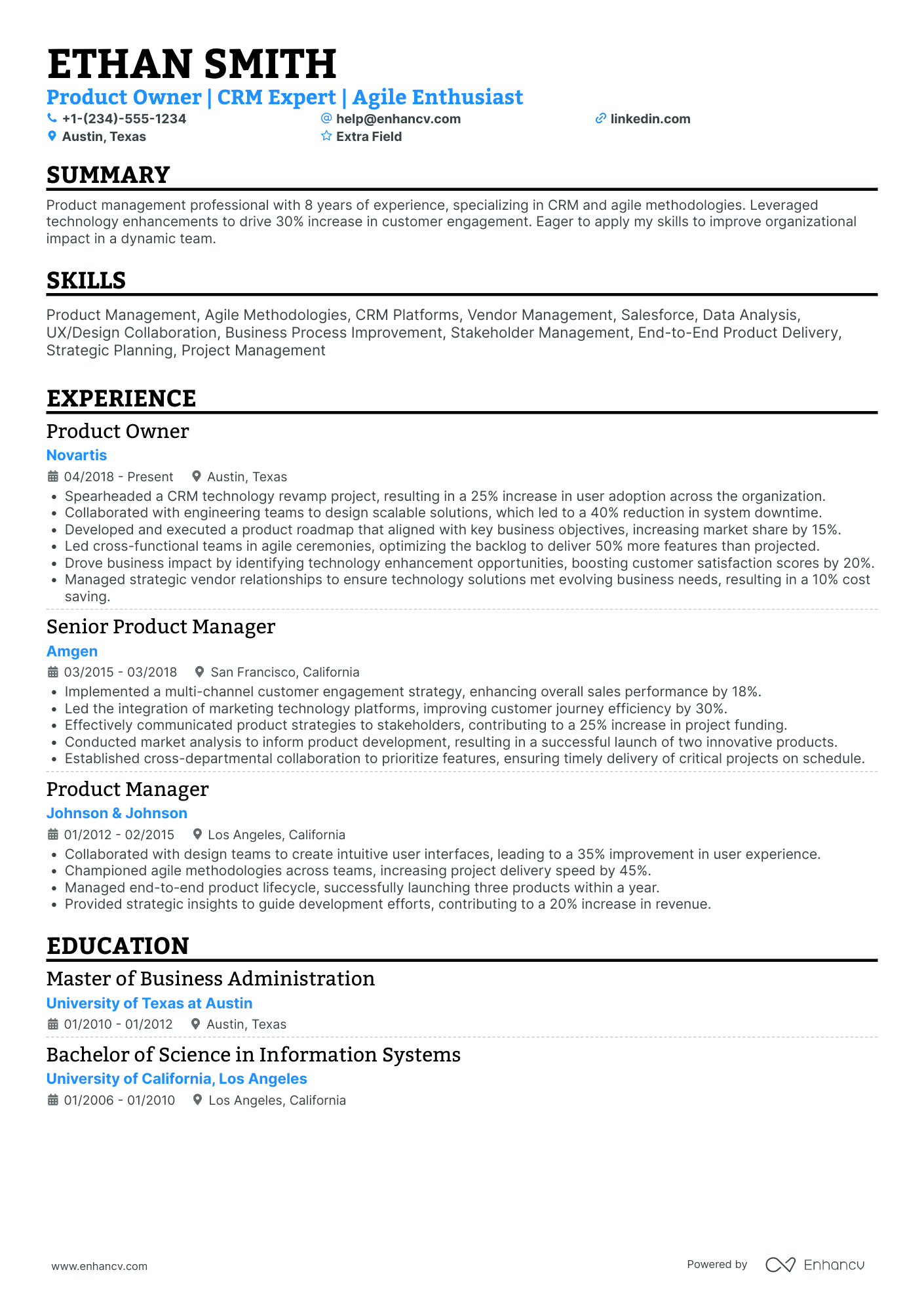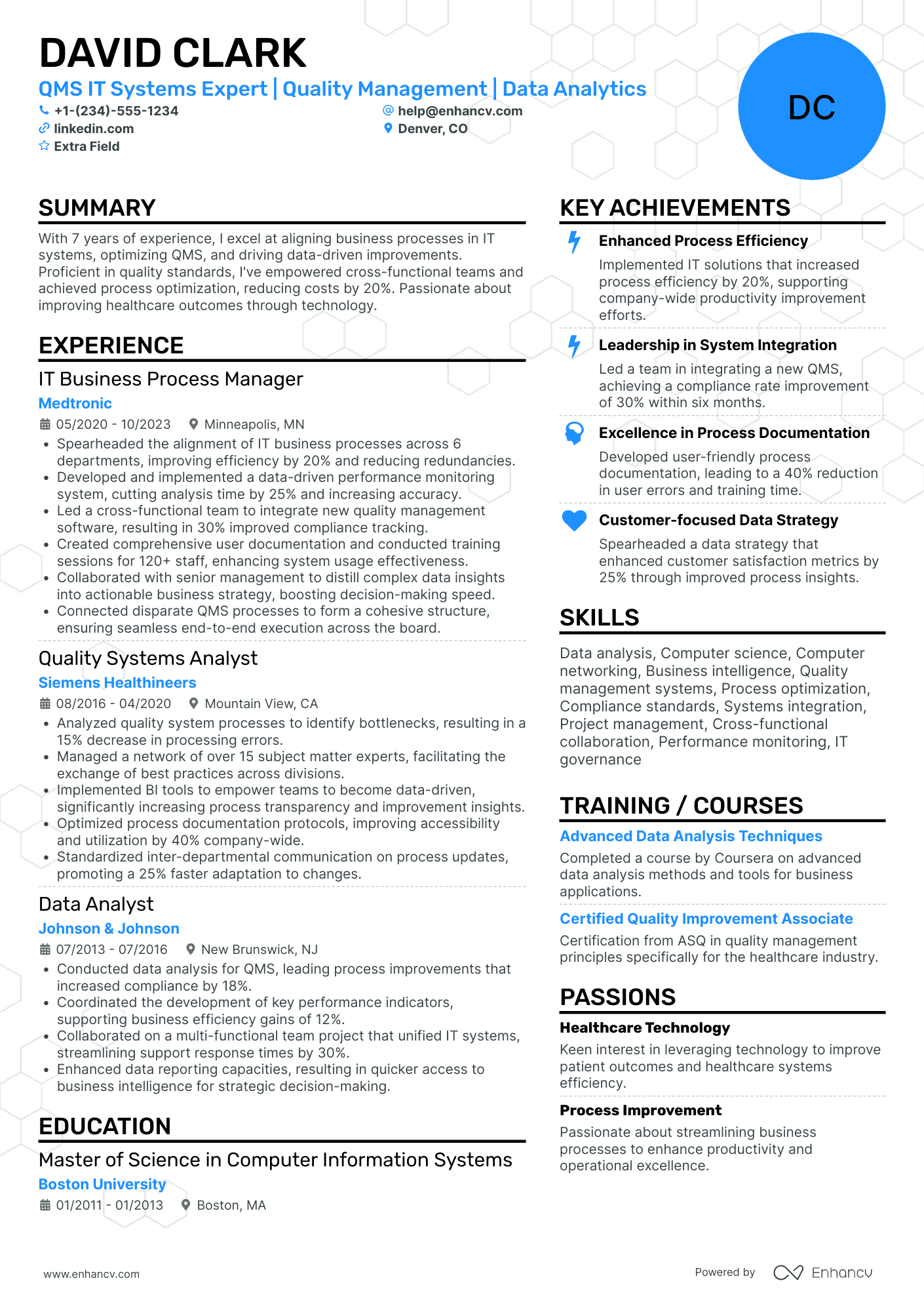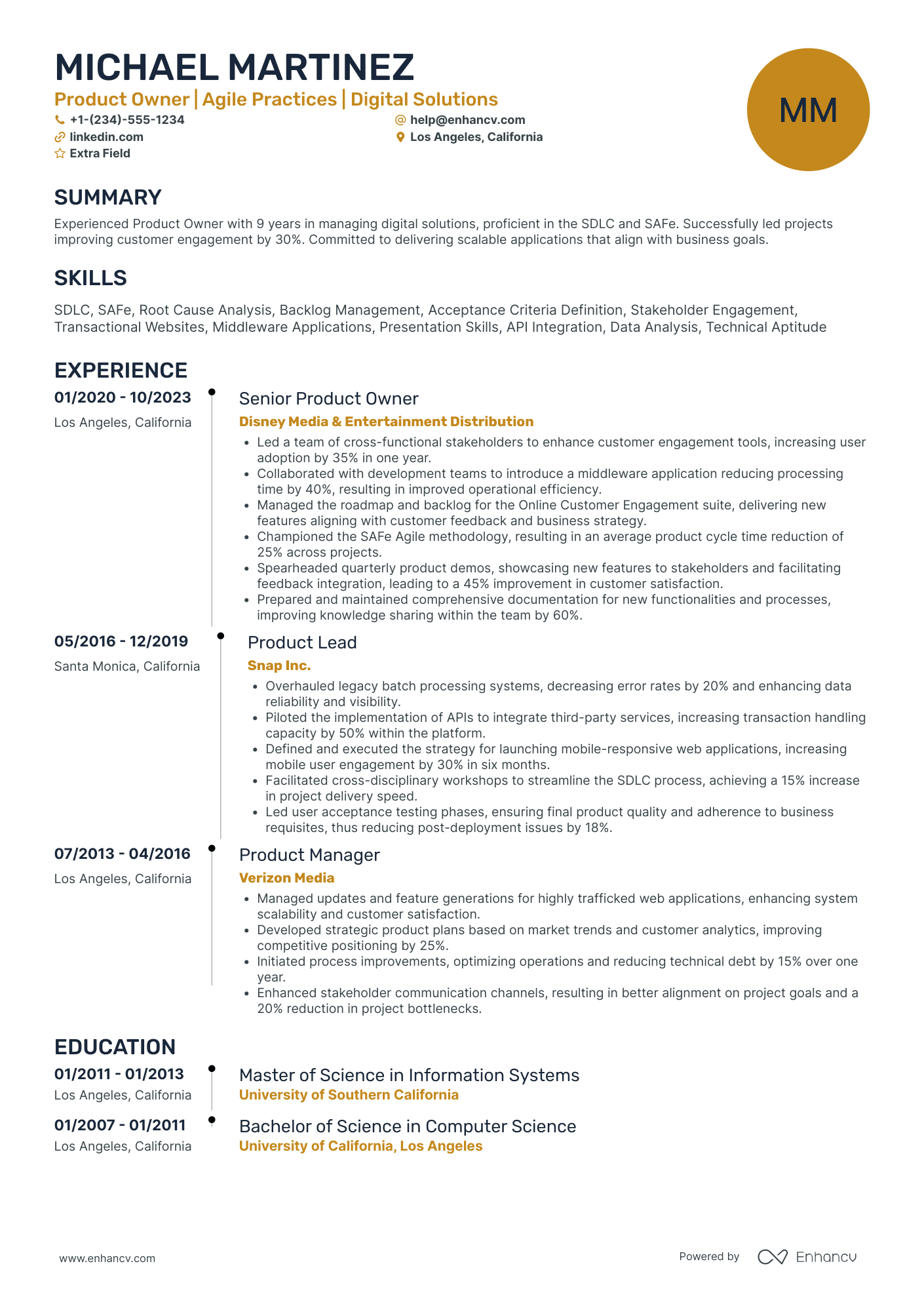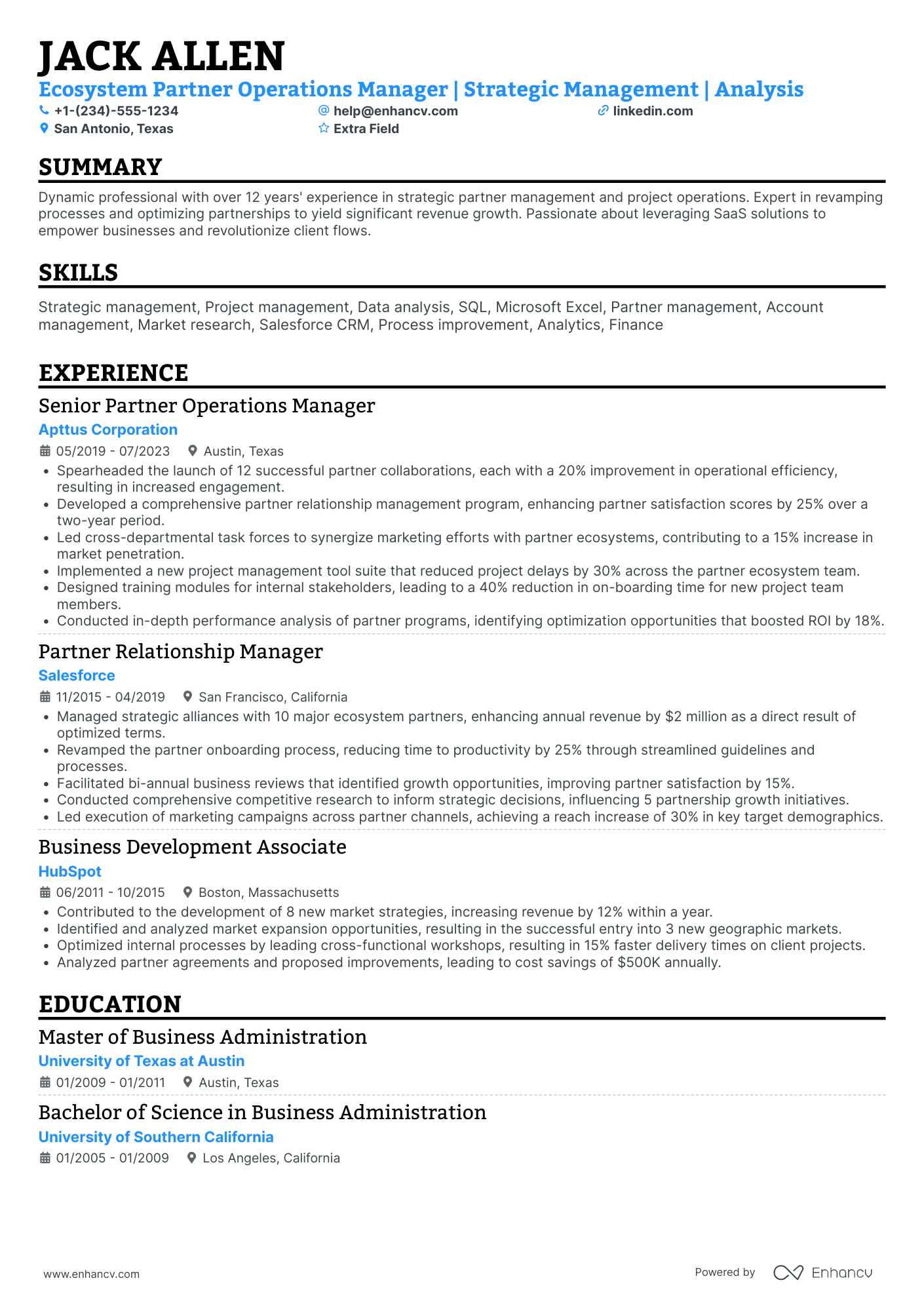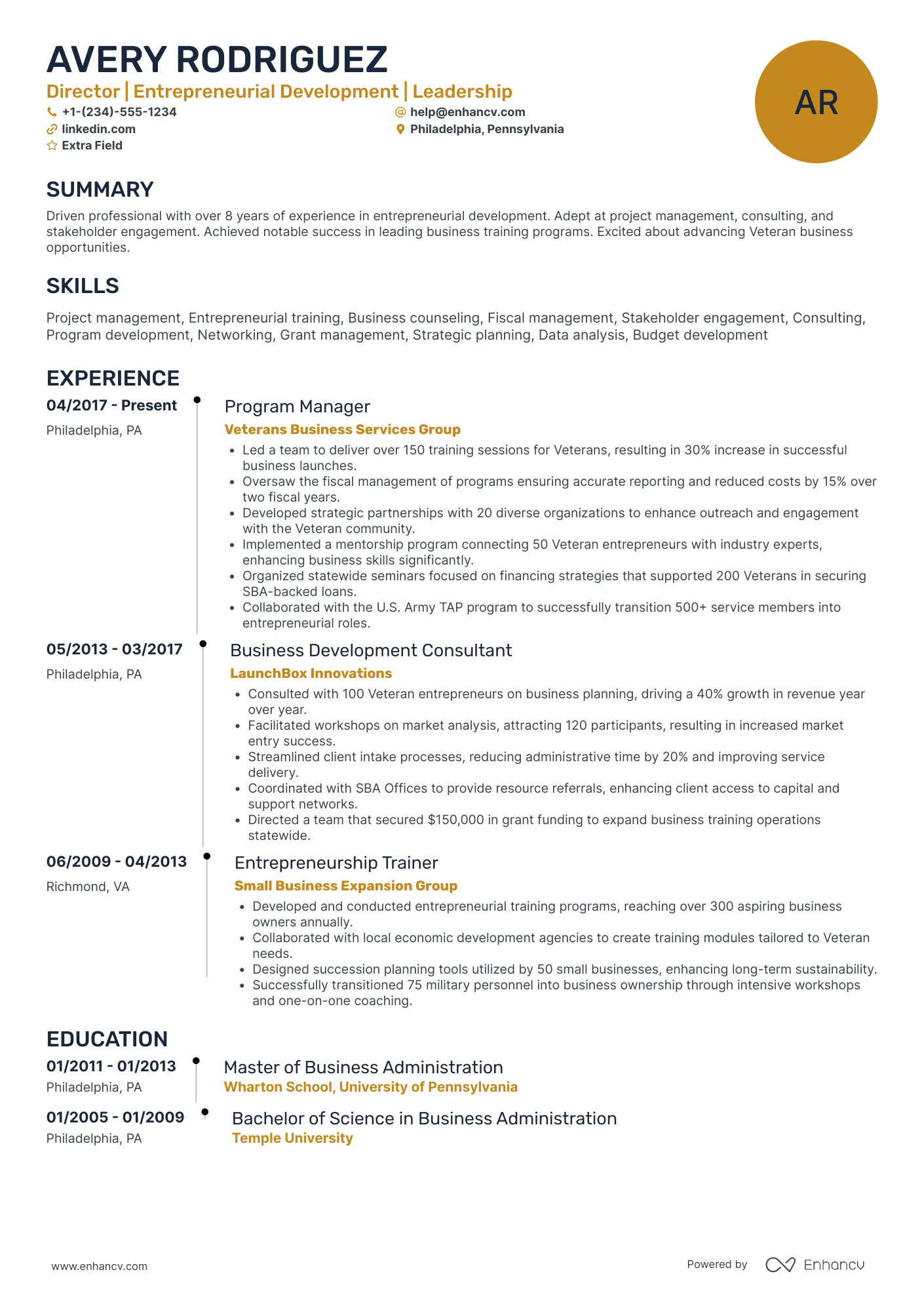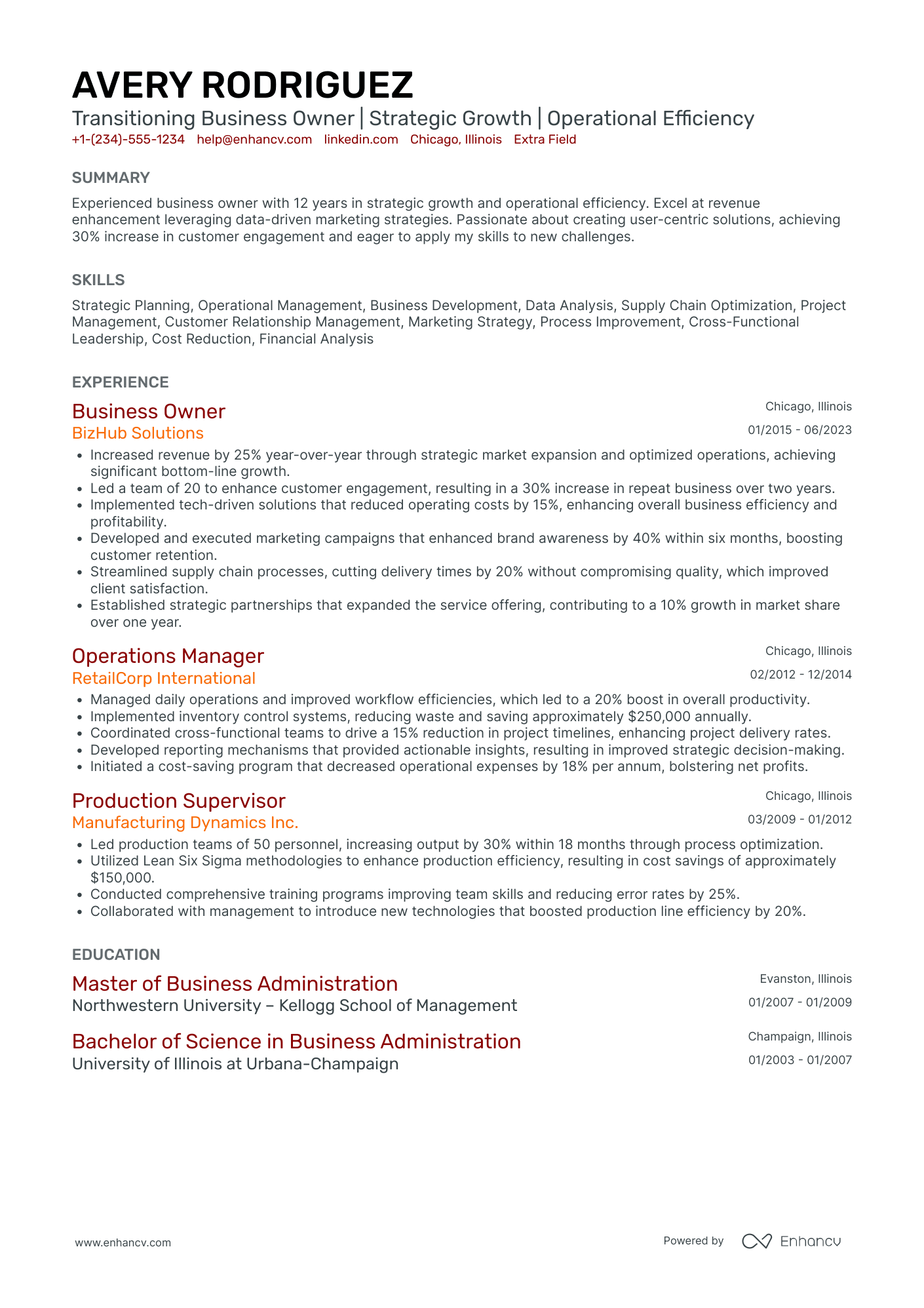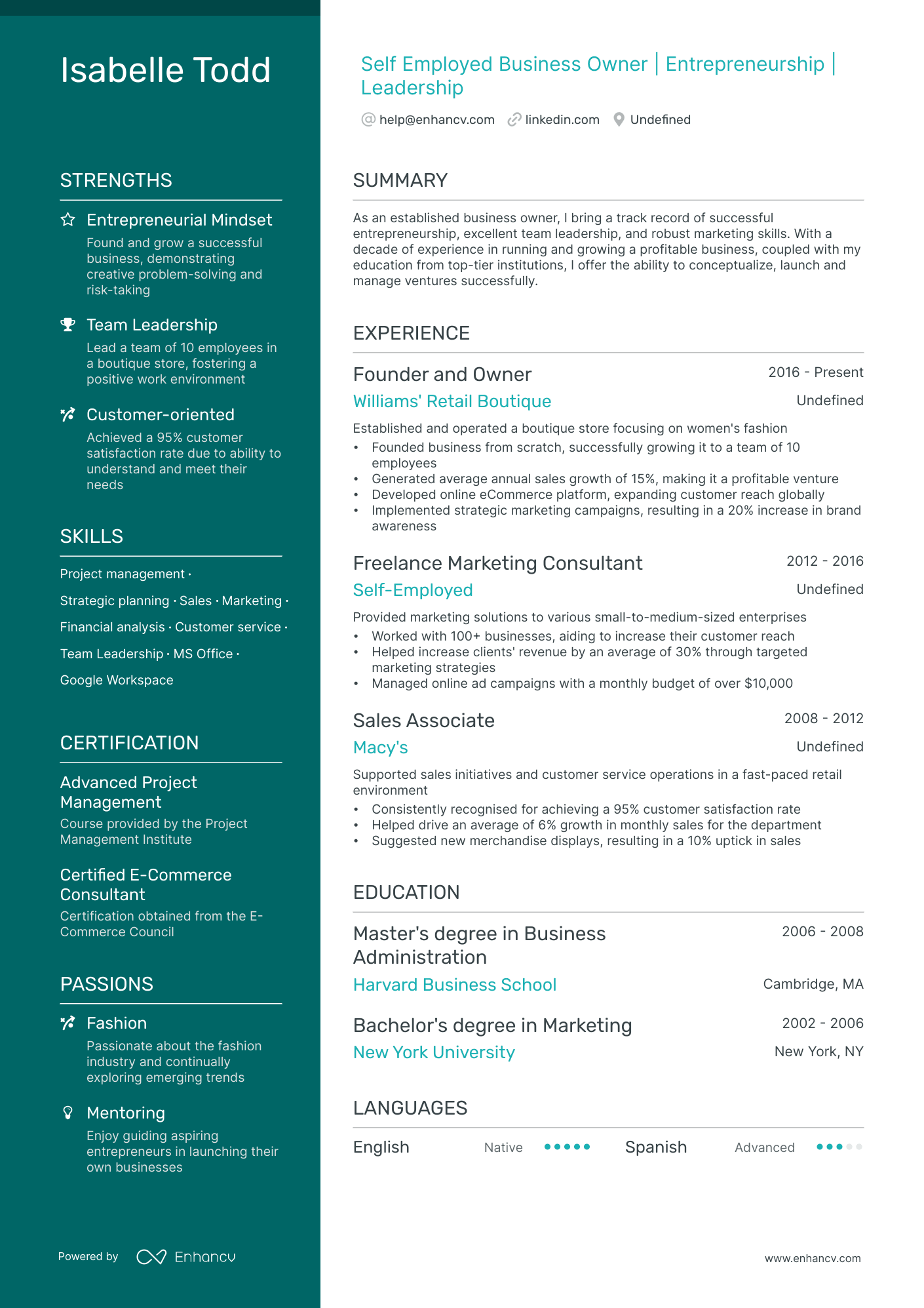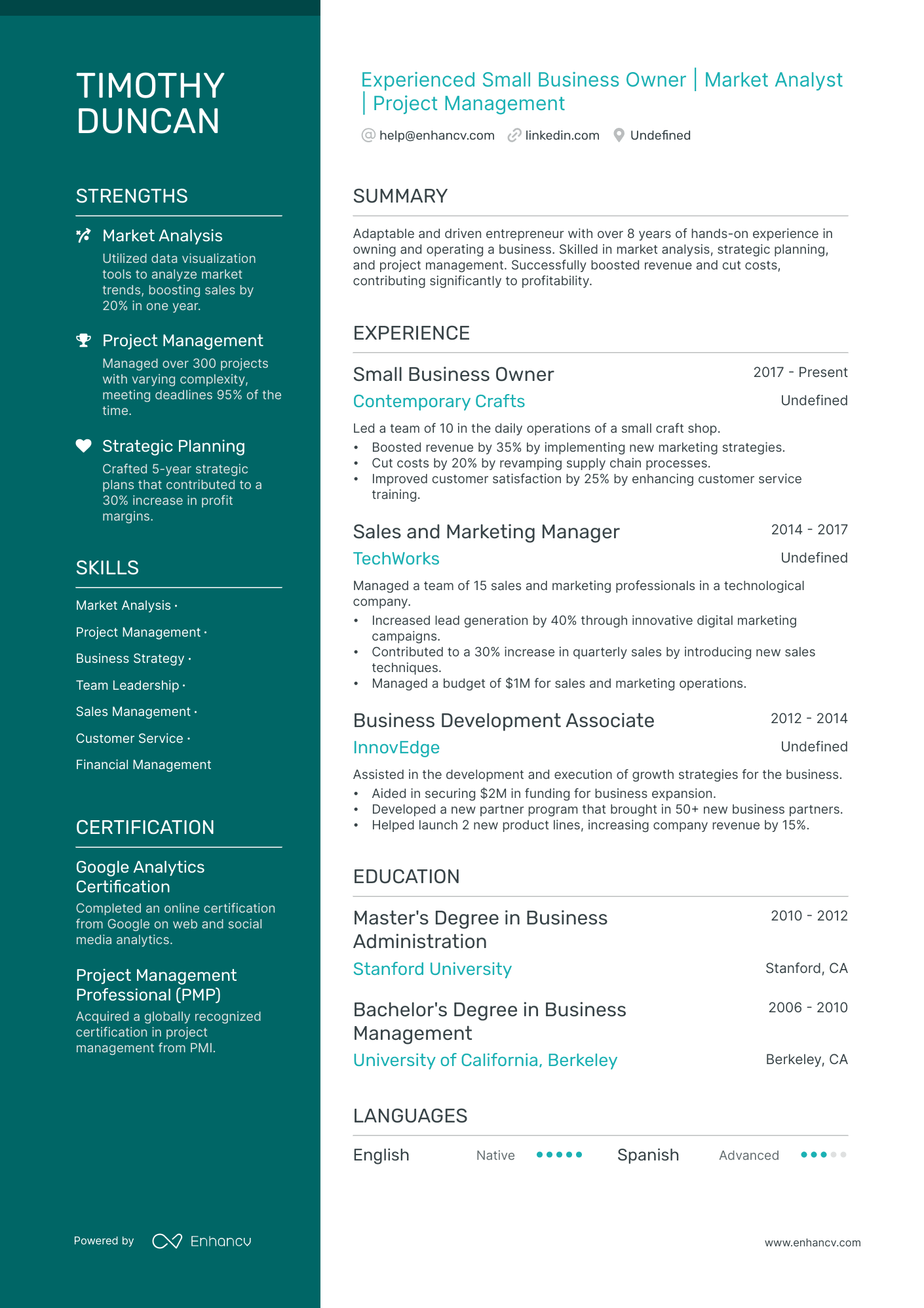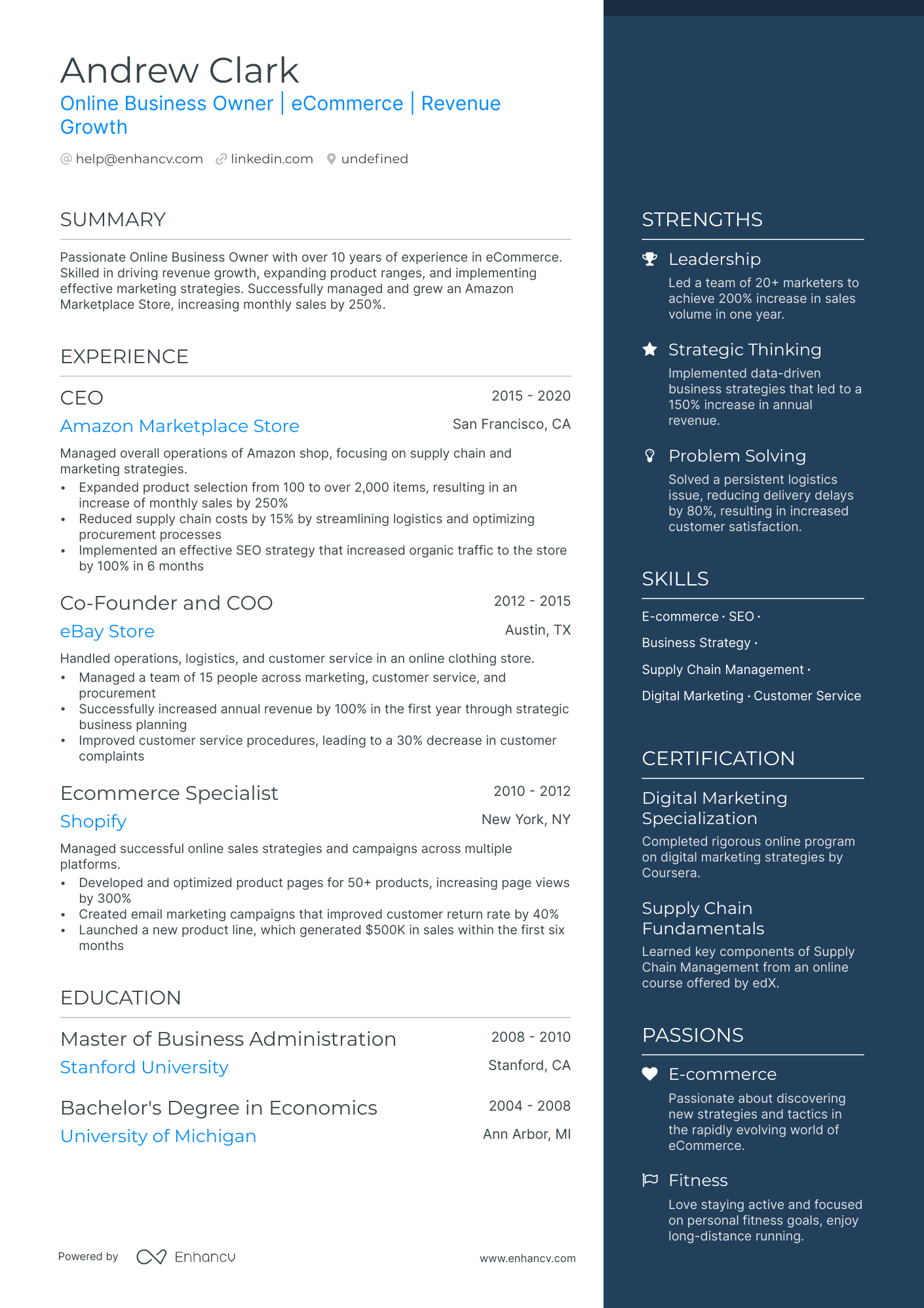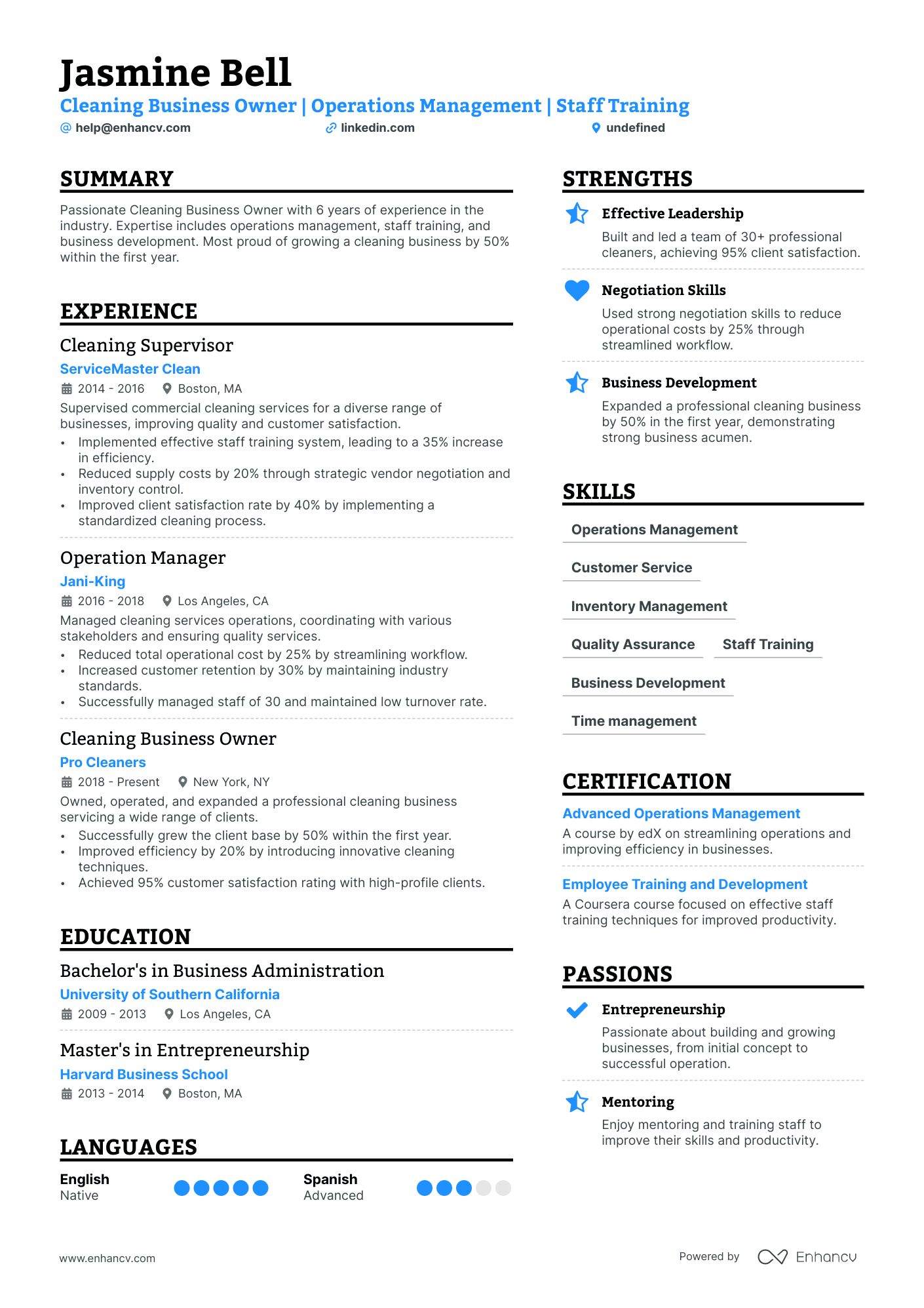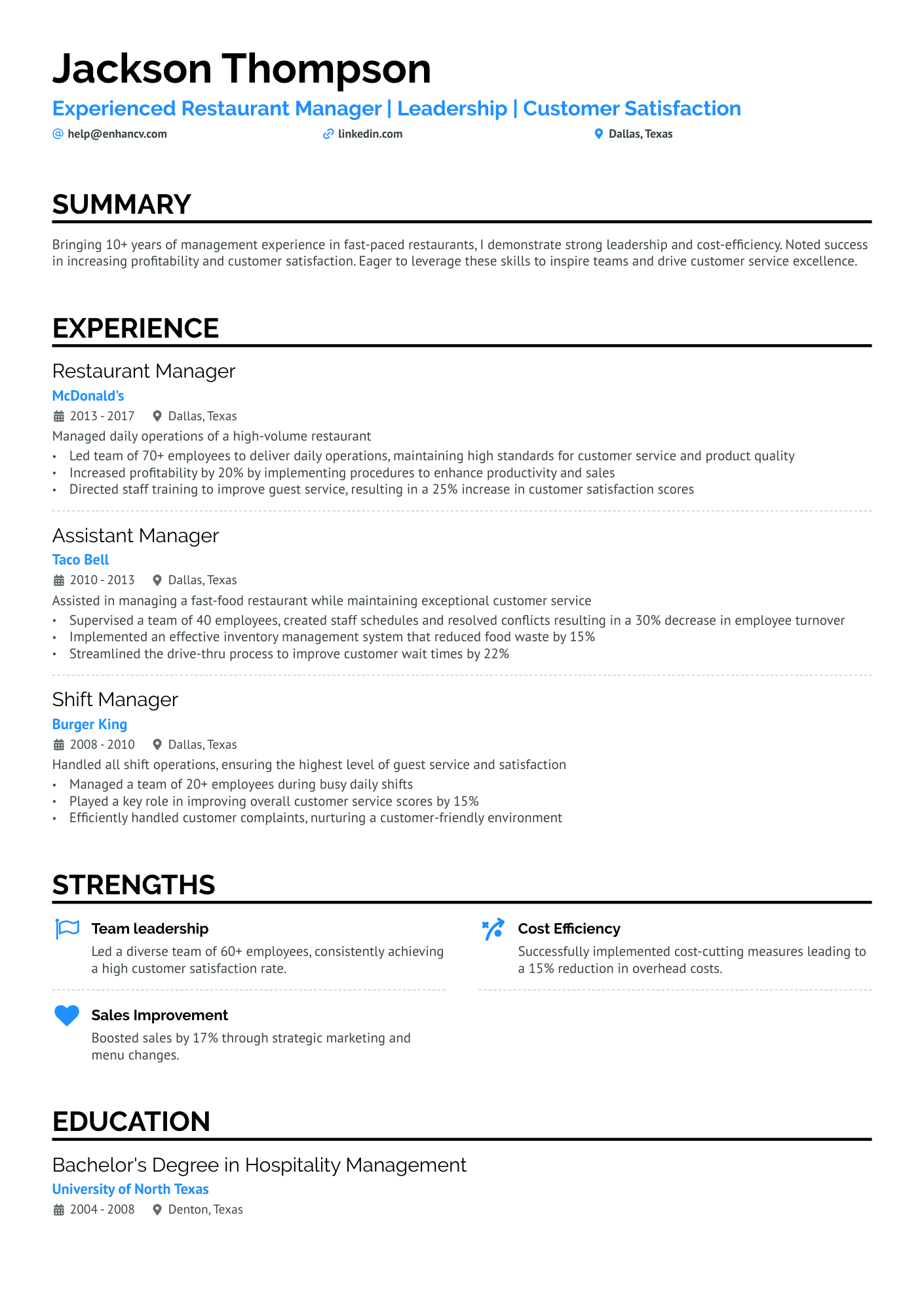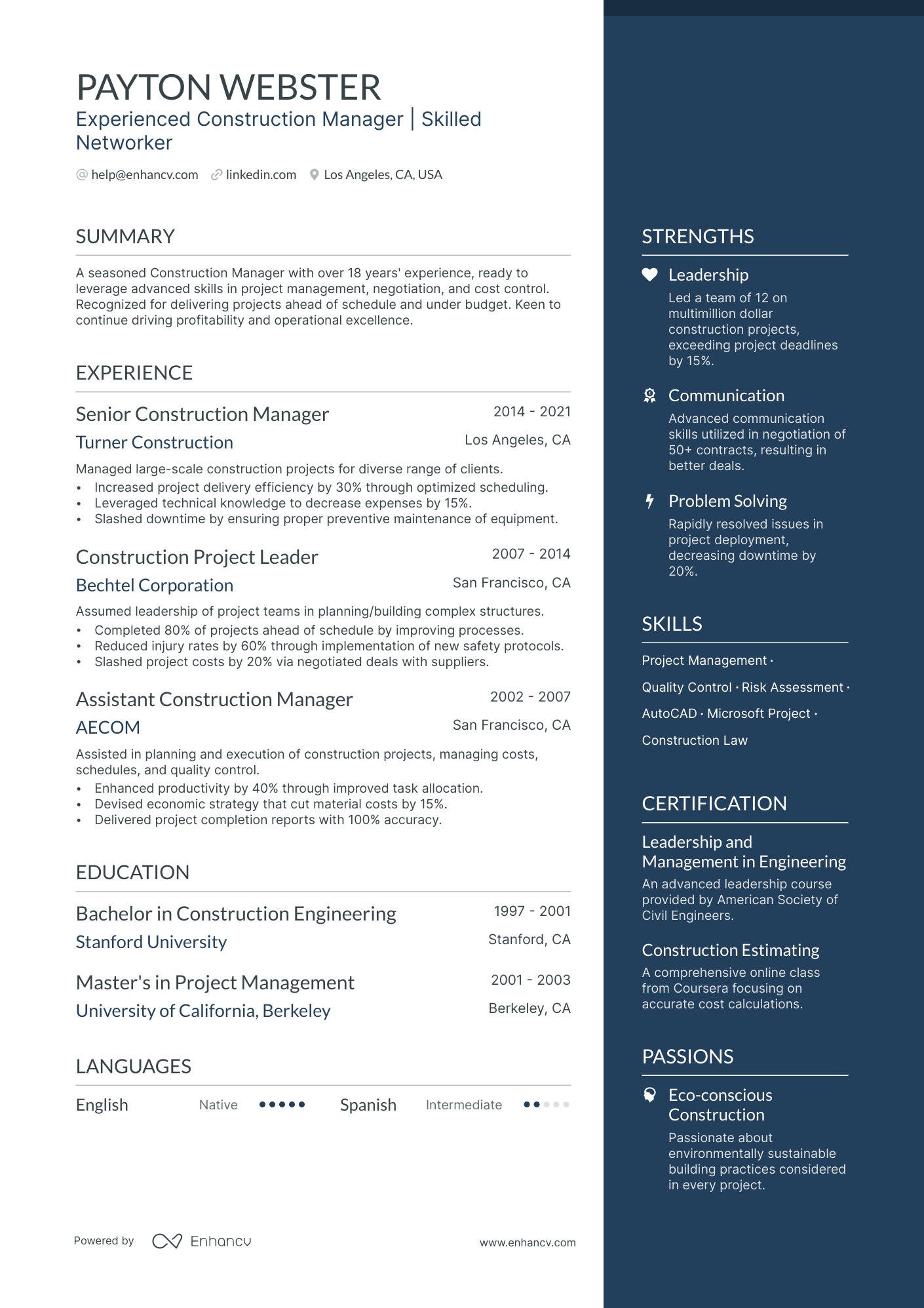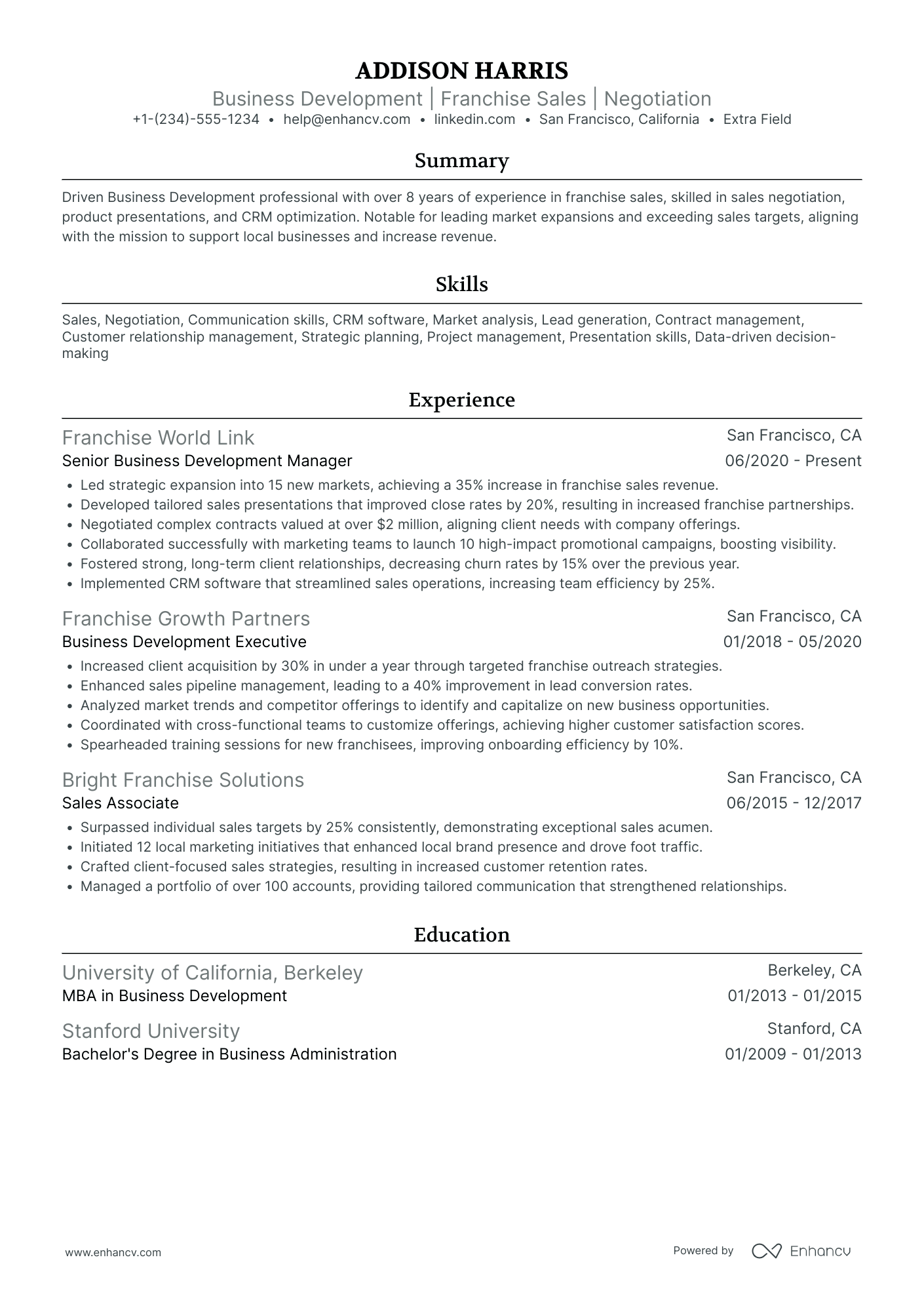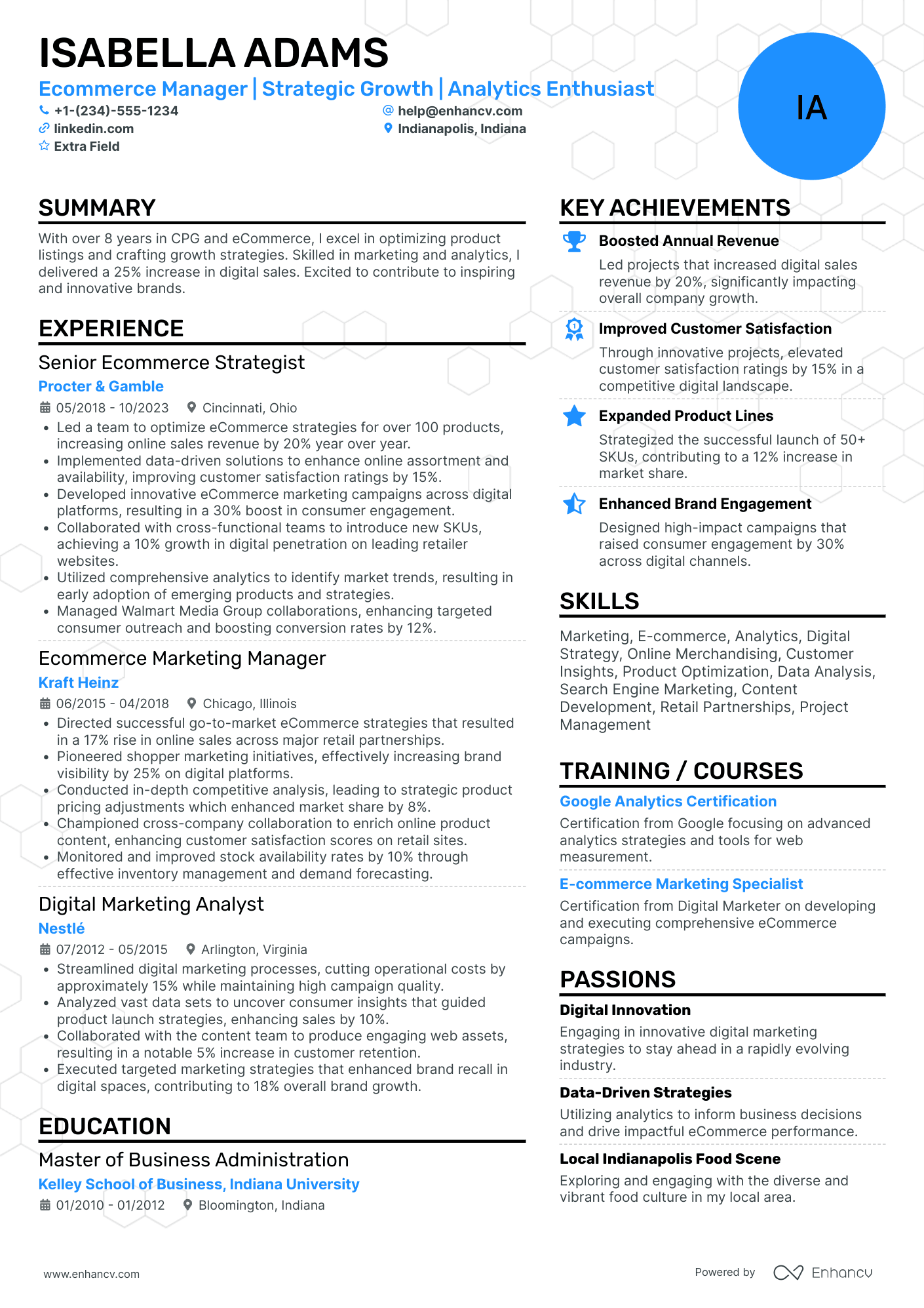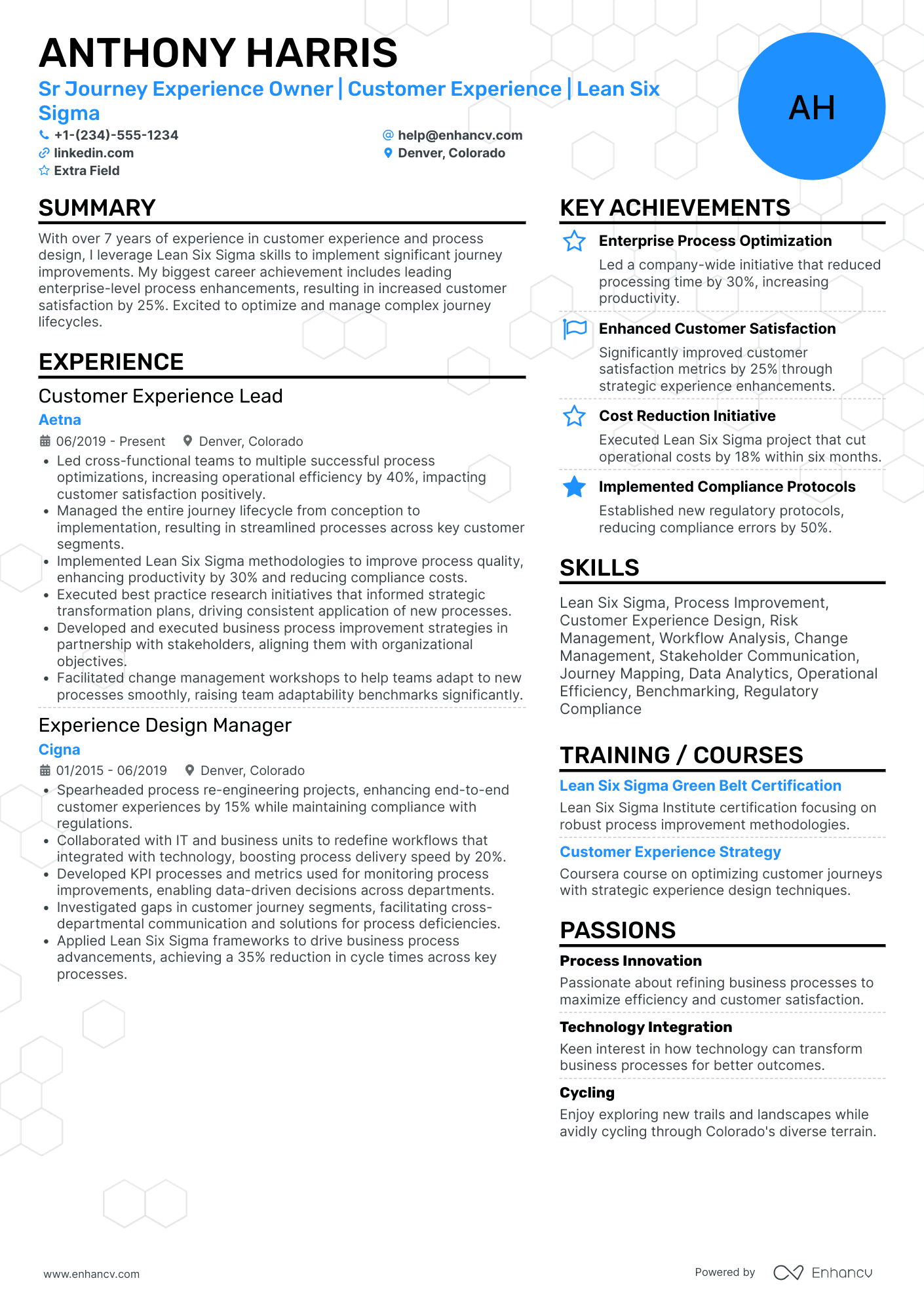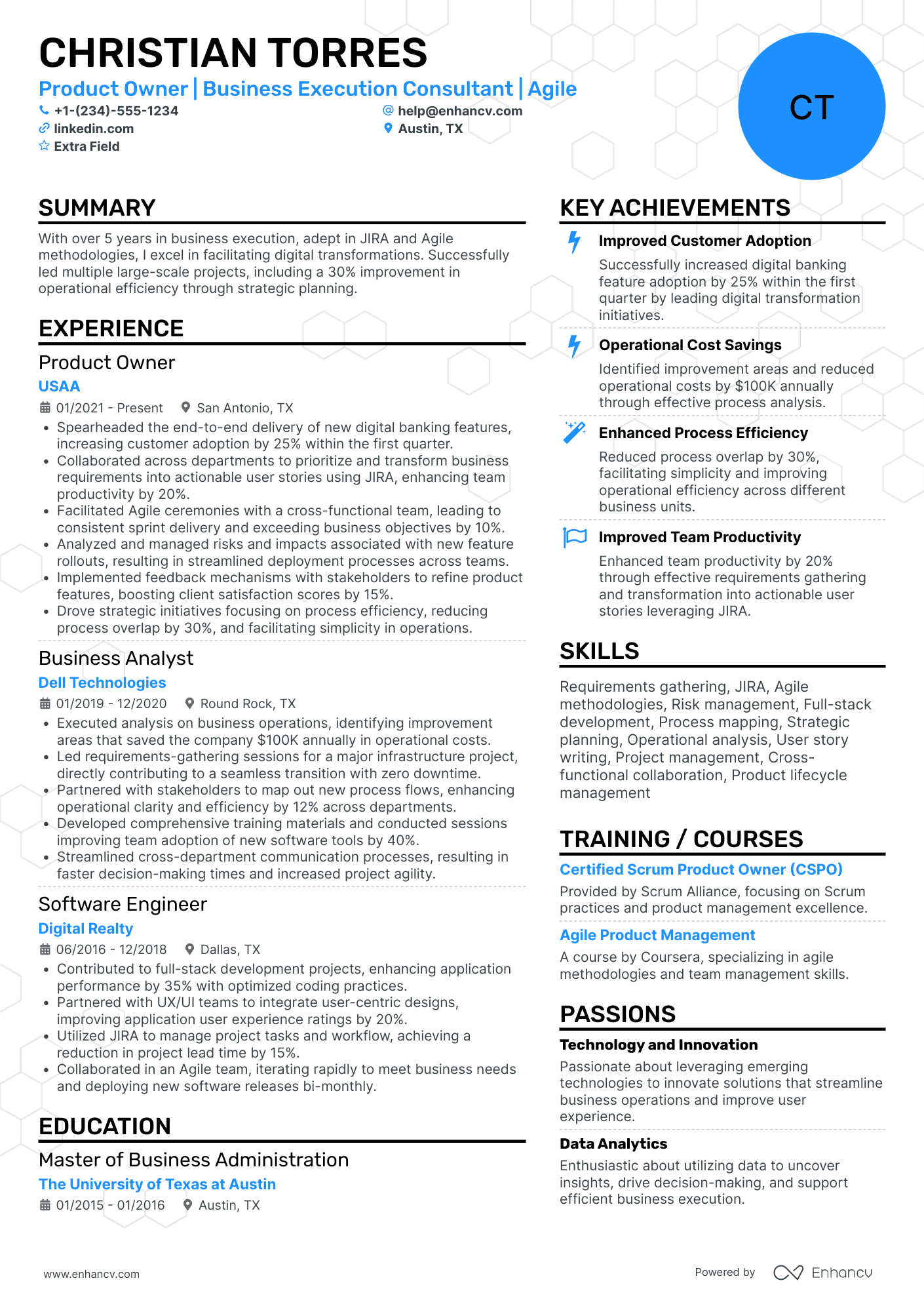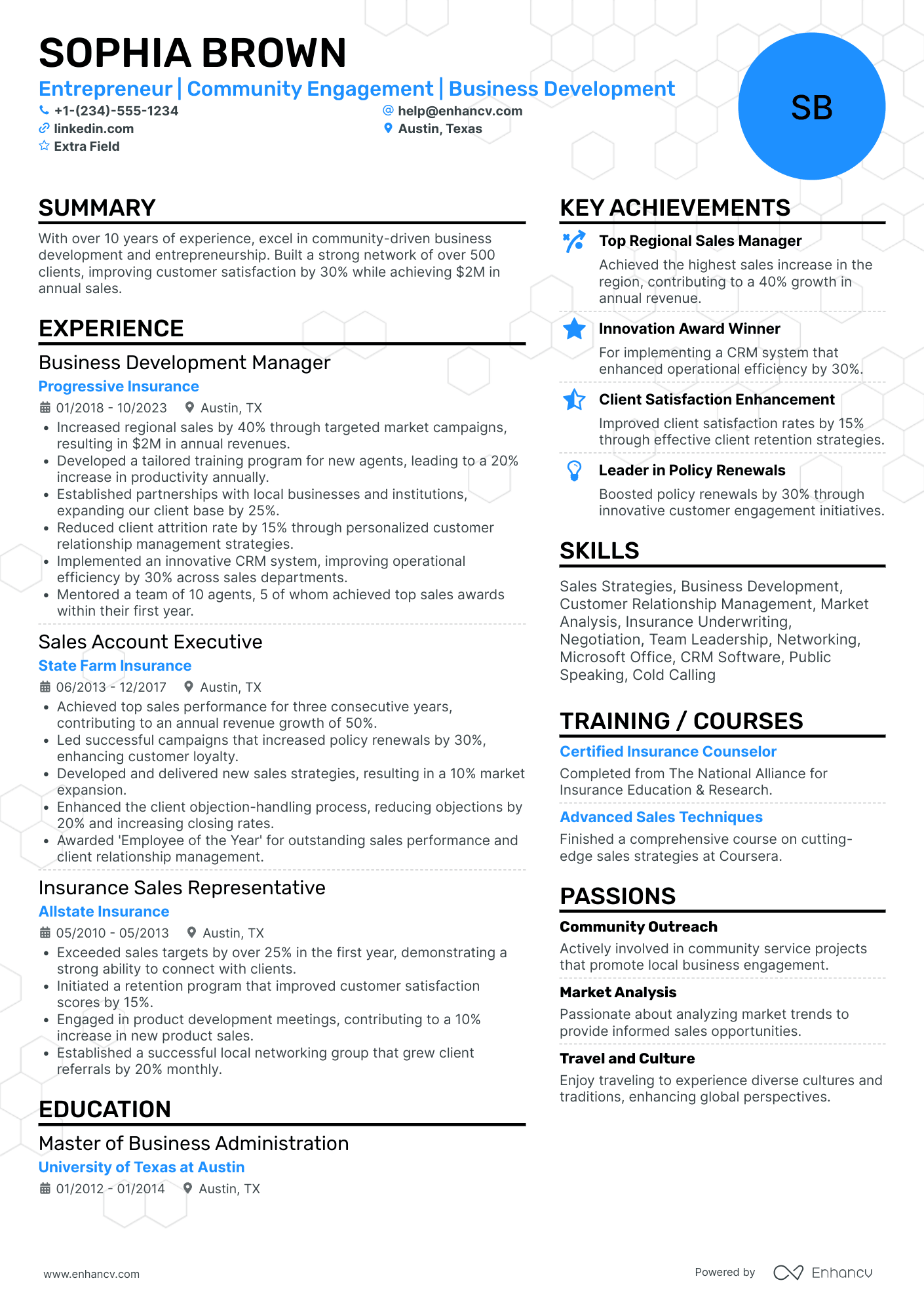As a business owner, you've mastered the art of juggling tasks with the skill of a circus performer. But even the most adept performers might seek a steadier stage after mastering the high-wire act of entrepreneurship. With about 23% of small businesses folding in their first year, the allure of a predictable workweek, steady income, and wearing fewer hats—unless they're part of the dress code—is understandably appealing.
The retirement of baby boomers is creating opportunities in small to mid-sized businesses, ideal for seasoned professionals and new entrepreneurs. In fields like tech and finance, highlighting your entrepreneurial experience in your resume can set you apart. This guide offers tips to seamlessly connect your past achievements with future goals, ensuring your skills shine in any setting.
Key takeaways
- Choose a hybrid resume format to reflect your transition from owning a business to regular employment, or vice-versa.
- Opt for designs that enhance readability, such as a two-column format.
- Choose subtle colors and easy-to-read fonts for optimal comprehensibility.
- Tailor your experience section to the specific job posting. Think of how your experience corresponds to it.
- Put industry-specific skills in a separate section, and intersperse your soft skills throughout your experience and summary entries.
- Your education and certifications can give extra credibility to your application.
Let's explore an actual resume sample.
Business owner resume sample
Use Hazel’s resume as a template for your own. It can serve as both transitioning from a business owner role to regular employment or the other way around. Or, use the Enhancv builder to create one from scratch. We promise it only takes minutes!
Hazel Clark
business owner
hazelclark@businessmail.com | @LinkedIn | Charlotte, North Carolina
Summary
Dynamic business owner with over 10 years of experience in managing operations, fostering business growth, and ensuring product excellence in competitive markets. Proven track record of successful vendor negotiations, strategic purchasing, and operational oversight. Committed to driving business stability and innovation while maintaining strong supplier relationships to enhance product delivery and inventory management.
Experience
business owner
Clark's Home Goods, Charlotte, NC
June 2013 – Present
- Lead a retail operation with annual revenue growth of 15%, expanding market presence through strategic vendor partnerships and quality product offerings.
- Spearheaded the implementation of an inventory management system that decreased operational costs by 20% while improving stock turnover rates.
- Organized and conducted over 30 buying trips annually to procure diverse and high-quality inventory that drove a 25% increase in customer satisfaction.
Operations Manager
GreenLeaf Designs, Charlotte, NC
March 2008 - May 2013
- Managed daily operations, including oversight of 25 staff and two retail locations, resulting in a 30% increase in efficiency through process improvements.
- Negotiated with over 50 service vendors and product suppliers, securing advantageous terms that enhanced profitability and supply chain reliability.
Education
Bachelor of Science in Business Administration
University of North Carolina at Charlotte
Graduated: 2007
Certifications
- Certified Business Manager (CBM)
- Project Management Professional (PMP)
Skills
- Inventory Management
- Vendor Negotiations
- Strategic Planning
- Financial Oversight
- Market Analysis
- Supply Chain Management
Languages
- English (Native)
- Spanish (Conversational)
Having seen a resume example, let’s break down the formatting that’ll get you the best results.
How to format a business owner resume
The right format for someone on the career change path is the hybrid resume. Giving equal weight to your skills and experience, this format shows the transferable abilities that will be relevant to your new position.
Top sections on a resume
Your first logical step is establishing which resume sections you’ll include. Here are our suggestions:
- Professional summary
- Skills and qualifications
- Professional experience
- Education, certifications, or licenses
- Additional sections that tell more about your personal story
We’ve addressed each one below.
Resume designs
- Concise is best, so in most cases, the one-page resume is enough to tell your work story. However, if you have over 10 years of experience, you can opt for two pages.
- Keep a professional outlook by placing a 1” margin on each side.
- A two-column design will provide enough space for your endeavors and is an HR favorite.
- Maintain your business outlook by adding subtle colors like dark green, blue, or gray. Pair this with an easy-to-read font, like Rubik.
- Resume lines are an elegant way to separate different sections.
Keep in mind the market you’re applying to – a Canadian resume, for instance, might have a unique layout.
Choose a resume template—from classic to creative—that corresponds to your business and the role you’re aiming to transition to.
Contact information
- Put the essential contact information, such as name, job title, and email, on your resume header.
- A photo can cause unnecessary bias, so generally go without. Still, check with your specific job posting requirements.
PRO TIP
Contrary to popular belief, our tests showed that fonts, colors, columns, and resume length don’t affect Applicant Tracking Systems parsing. Focus on matching job description language and formatting details like dates and bullet symbols as those may affect your application.
File formatting
- A PDF secures all elements of your resume layout in place.
- Use a clear naming convention, like FirstName_LastName_JobTitle_Resume.
Got a resume? Try the Enhancv resume checker to see its score!
Is your resume good enough?
Drop your resume here or choose a file. PDF & DOCX only. Max 2MB file size.
After choosing your resume format, the next step is detailing your professional experience to showcase your career progression.
How to write your business owner resume experience
Your experience section will be different depending on whether you’re applying to take on someone else’s business, or you’re returning to the workforce after developing your own. You can leverage your abilities regardless of the field you’re applying in. Here are some general tips you can follow:
- Outline any previous professional roles, including your accomplishments and how these experiences prepared you for business ownership.
- Describe the vision and core focus of your own business, detailing how you've developed and executed its unique value proposition.
- Present measurable successes and significant achievements from your business that demonstrate your capability to drive results.
- Mention any experiences where you've effectively taken on leadership roles in businesses without successors, emphasizing your adaptability and strategic foresight.
- Highlight technical skills relevant to business management, such as proficiency with financial software, CRM systems, or other specialized tools.
- Provide examples of your soft skills, such as communication, leadership, and problem-solving, illustrating how these have been essential in managing your business and will be valuable in new roles.
A business owner job description can be a position in management, business development, or business consulting. Take a look at this real job posting:
Small business consultant
Position overview
We are seeking a knowledgeable and experienced Small Business Consultant to join our team. The ideal candidate will have a strong understanding of small business operations, financial management, marketing strategies, and overall business planning. As a Small Business Consultant, you will work closely with clients to identify their business needs, develop strategic plans, and implement solutions that drive success.
Responsibilities
- Conduct thorough assessments of clients’ business operations, including financial statements, marketing strategies, and operational processes.
- Identify key challenges and opportunities for growth within client businesses.
- Develop and present detailed business plans, strategies, and recommendations to clients.
- Assist clients in implementing business strategies and monitor progress to ensure successful execution.
- Provide expert advice on financial management, including budgeting, cash flow management, and funding options.
- Advise on marketing and sales strategies to help clients increase their market presence and customer base.
- Offer guidance on improving operational efficiency and productivity.
- Stay updated on industry trends, market conditions, and best practices to provide relevant and timely advice.
- Build and maintain strong relationships with clients, understanding their unique needs and goals.
- Conduct workshops, seminars, and training sessions for clients on various business topics.
- Prepare and deliver regular reports on project progress and outcomes.
- Occasional overnight regional travel may be required.
Qualifications
- Bachelor’s degree in Business Administration, Finance, Marketing, or a related field (MBA preferred)
- 5+ years of experience as a small business owner, business consultant, or similar advisory role
- 5+ years of hands-on experience managing and optimizing financial operations using QuickBooks, including proficiency in financial reporting. Consistently improved workflow efficiency and accuracy through customized QuickBooks solutions tailored to business needs
- Strong understanding of small business operations and challenges
- Excellent analytical, problem-solving, and decision-making skills
- Proficiency in financial analysis and planning
- Solid understanding of marketing principles and strategies
- Exceptional communication and interpersonal skills
- Ability to build and maintain positive client relationships
- Strong project management skills with the ability to manage multiple clients and projects simultaneously
- High level of integrity and professionalism
- Proficiency in Microsoft Office Suite and business consulting software
Create a targeted resume
Let’s face it—even if you’re Jeff Bezos, you were once a beginner. So, you have some knowledge of what it means to be a small business owner—even if the business was establishing yourself as a professional. Apply your know-how by targeting the specific job posting with your resume. Try to find parallels that will make recruiters see you as a great fit.
A winning strategy in a targeted resume is using keywords from the job posting, and action verbs to make a strong impression.
Here’s an experience section tailored to the job ad above:
- •Spearheaded comprehensive business assessments leading to a 30% increase in operational efficiency by streamlining processes and implementing strategic technological integrations.
- •Developed and executed tailored business strategies that increased client revenue by an average of 25% within the first year of consultation.
- •Facilitated financial management improvements, including budget adjustments and cash flow optimizations, enhancing clients' financial health by 40% on average.
- •Conducted workshops on financial literacy and business strategy, achieving a 95% satisfaction rate from participant feedback.
- •Guided 15+ small businesses in adopting digital marketing strategies, resulting in an average 50% growth in online customer engagement.
- •Managed multiple client projects simultaneously with a focus on timely and under-budget delivery, maintaining a client retention rate of over 85%.
It’s effective because:
- Highlights leading comprehensive assessments and strategic improvements, meeting the job's need for thorough client operation evaluations.
- Describes developing and executing strategies that boost client revenue, showcasing strategic planning skills essential for the role.
- Notes management of multiple projects and high client retention rates, demonstrating key project management abilities and client relationship skills.
To make your experience stand out, learn how to quantify your achievements and impact in this next section.
How to quantify your experience on а resume
Quantifying your experience on your resume is essential as a business owner. Focusing on results attracts potential clients. By showing measurable achievements, like boosting sales or cutting costs, you clearly demonstrate your impact. This proves your skills and builds your credibility with potential clients or investors.
Consider these examples an inspiration for your resume:
- Include specific numbers on revenue growth or profit margin increases under your leadership.
- Mention the number of process improvements implemented in your former business.
- State numbers that reflect customer growth or customer retention rates.
- Include information about any cost-saving measures you have implemented.
- Quantify your experience with employee skill development or the number of employees you trained.
Understanding both hard and soft skills is crucial, so let's explore how to integrate these into your resume.
Business owner skills on your resume
As a future or ex-business owner, your ability to manage client relationships and adapt to new challenges is vital. The skills section of your resume should highlight your industry-specific skills, like different software. Tailor this section according to the job ad you’re interested in. Make sure you don’t exaggerate, as these capabilities can be easily measured and tested. Here’s what you can add:
Best hard skills for your business owner resume
- Financial Analysis
- Budgeting
- Project Management
- Risk Management
- Strategic Planning
- Inventory Management
- Supply Chain Management
- Sales Forecasting
- Performance Metrics Analysis
- Data Analysis
- Marketing Automation Software
- Customer Relationship Management (CRM) Software
- Enterprise Resource Planning (ERP) Systems
- Business Intelligence Software
- Social Media Advertising
- Search Engine Optimization (SEO)
- Microsoft Office Suite
- Google Analytics
- E-commerce Platforms
- Point of Sale (POS) Systems
We mentioned soft skills are best illustrated with examples throughout your experience and summary sections. These skills are what drive most of your success as both an employer and an employee. So, think about which ones best present your character.
Best soft skills for your business owner resume
- Leadership
- Decision Making
- Time Management
- Critical Thinking
- Conflict Resolution
- Problem-Solving
- Creativity
- Emotional Intelligence
- Persuasion
- Adaptability
- Negotiation
- Delegation
- Stress Management
- Empathy
- Patience
- Resilience
- Multitasking
- Diplomacy
- Coaching
- Strategic Visioning
Now that we've covered skills, we'll transition to discussing your educational background and any certifications you've acquired.
How to list your certifications and education on your resume
Your education section is still relevant even if you have lots and lots of experience. It shows recruiters you’re dedicated and organized and provides theoretical knowledge you build your experience on.
When detailing this section for a business owner transitioning to another role:
- Include your educational institution to underscore credibility and convey professionalism.
- State the year you completed your degree to offer context regarding the timing of your education. Omit the month for simplicity.
- Underline relevant coursework or certifications pertinent to the new role, emphasizing skills and knowledge that align with your career shift.
- Feature any academic or professional honors such as leadership awards, business competitions won, or scholarships that demonstrate your competence and dedication.
Here’s an education entry tailored to the job posting above:
Here’s what makes it work:
- Relevant degrees (MBA and Bachelor of Science in Finance) from prestigious institutions (Harvard Business School and The Wharton School).
- Quantitative display of academic excellence with GPAs clearly mentioned.
- Well-regarded academic institutions like Harvard Business School and The Wharton School at the University of Pennsylvania lend credibility and align with the high level of professionalism expected for the position.
Dedicating a section to certifications on your resume provides a swift and effective way to demonstrate to potential employers your commitment to exceeding the foundational qualifications. Take your pick from our suggestions:
Best certifications for your business owner resume
After detailing your education and certifications, we'll focus on crafting a compelling resume summary that captures your unique value.
How to write your business owner resume summary
When recruiters initially scan your resume, the career statement will capture their attention. As a transitioning small business owner, your resume summary should effectively display your diverse skill set.
- Include 3 – 5 sentences that summarize your top qualifications and unique qualities.
- Use active voice and strategic keywords related to your new role.
- Highlight measurable achievements from your business experience that demonstrate your impact.
- Mention any additional training or certifications you’ve pursued that align with your new career path.
- Conclude by emphasizing how your extensive experience as a business owner can bring value to the prospective company.
Here’s a summary targeting the job ad above:
It effectively highlights the candidate's extensive experience and specialized skills, directly aligning with the job's requirements for a Small Business Consultant. It underscores their proven ability to optimize business operations, signaling a strong match with the strategic and operational demands of the role.
With your resume's core components in place, let’s consider adding additional sections that can further enhance your marketability.
Optimize your resume summary and objective for ATS
Drop your resume here or choose a file.
PDF & DOCX only. Max 2MB file size.
Additional sections for a business owner resume
When transitioning to a new role, adding optional sections to your resume can spotlight unique skills and experiences that align with the job's requirements. Thus, you showcase your versatility and ability to expand beyond typical job duties.
Here are some effective optional sections to consider:
- Highlight specific projects that are relevant to the new role, showing your hands-on experience and problem-solving skills.
- List memberships in professional organizations to show your active engagement and network in the industry.
- Include volunteer positions that have given you experience relevant to the new role, underscoring your commitment to community and transferable skills.
- Mention any language skills you have that can help you work in multinational environments.
In conclusion
Our guide helps business owners who are transitioning to the role of an employee, emphasizing the importance of tailoring their resumes to underline transferable skills and relevant experiences. It suggests focusing on achievements and clearly demonstrating leadership and problem-solving abilities.
Business Owner resume examples
By Experience
By Role
